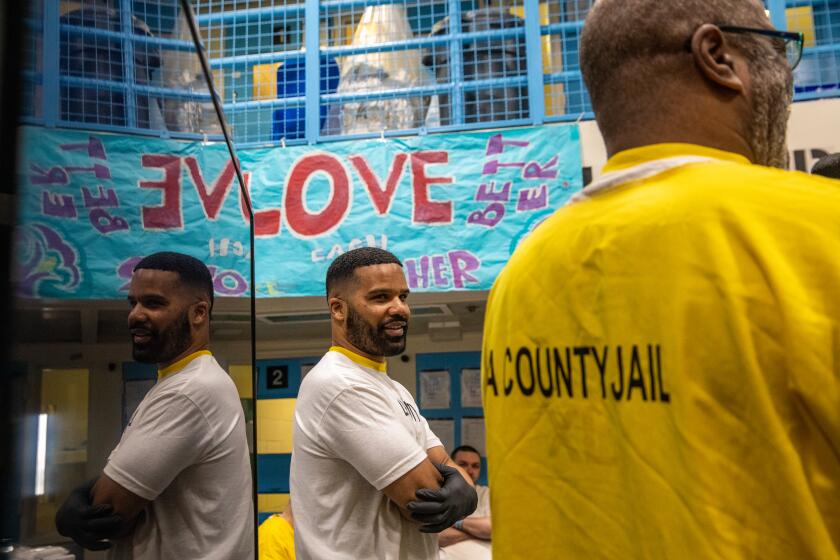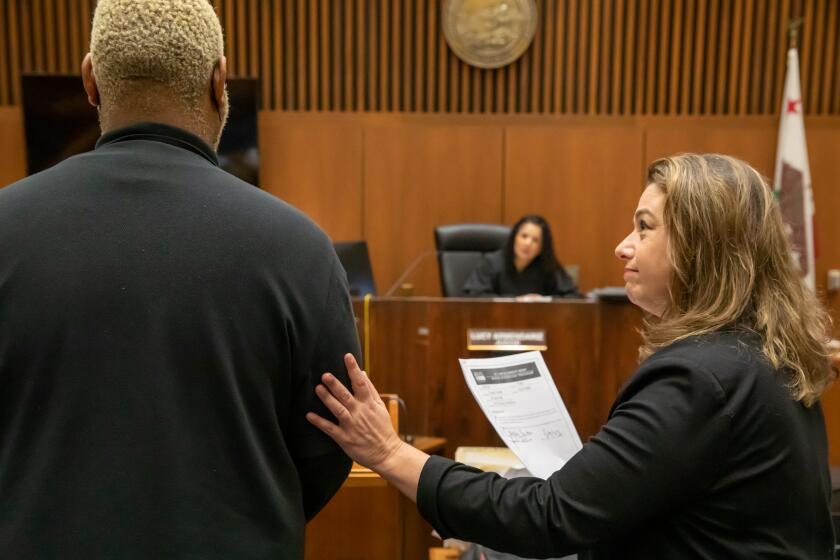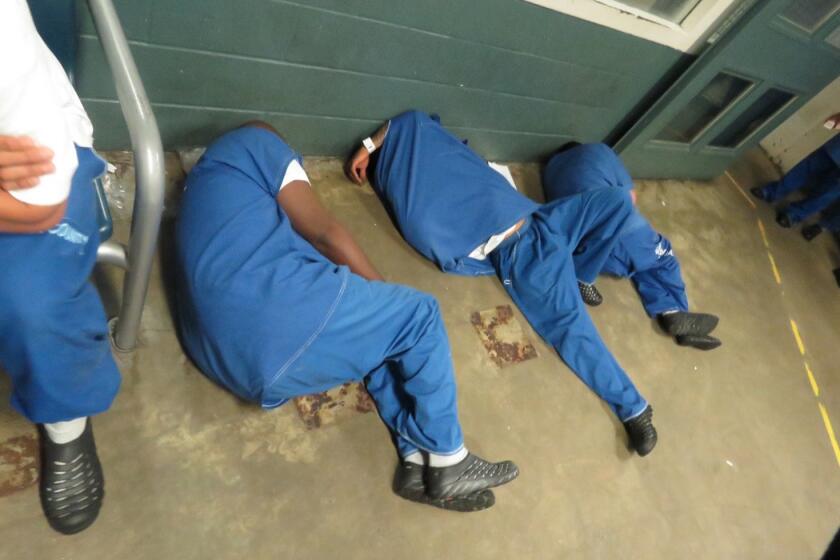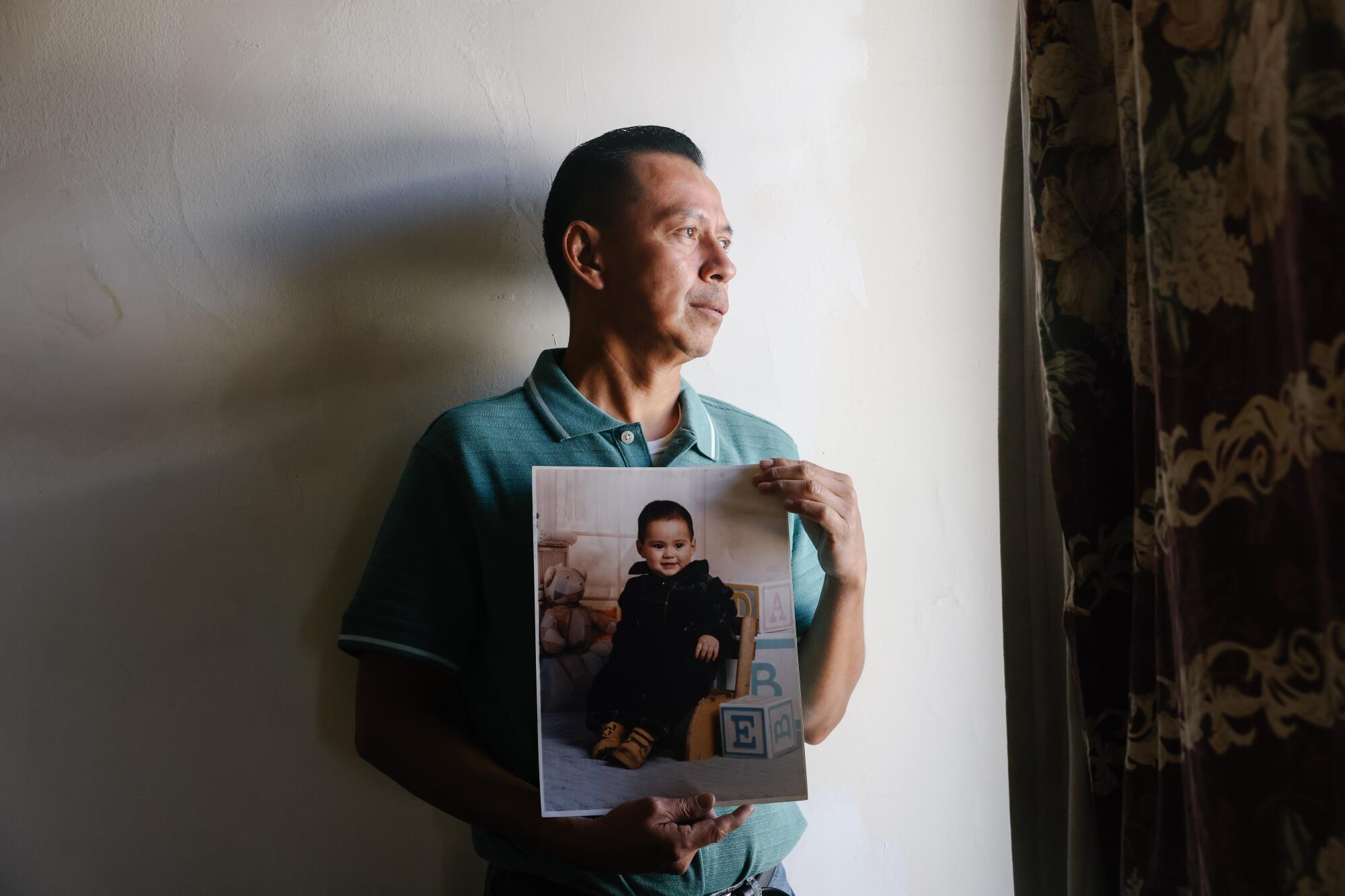
- Share via
As he gets ready for the meeting, Asael Roblero doesn’t need to look far to remember why he keeps going.
When he wakes up, he isn’t in a bed because his son destroyed it.
When he reaches for a shirt, he has few to choose from because his son threw out most of his clothing.
When he walks into his kitchen for breakfast, he is met with the “F— you” that his son spray-painted on the wall next to the refrigerator.
Because his son is deeply ill.
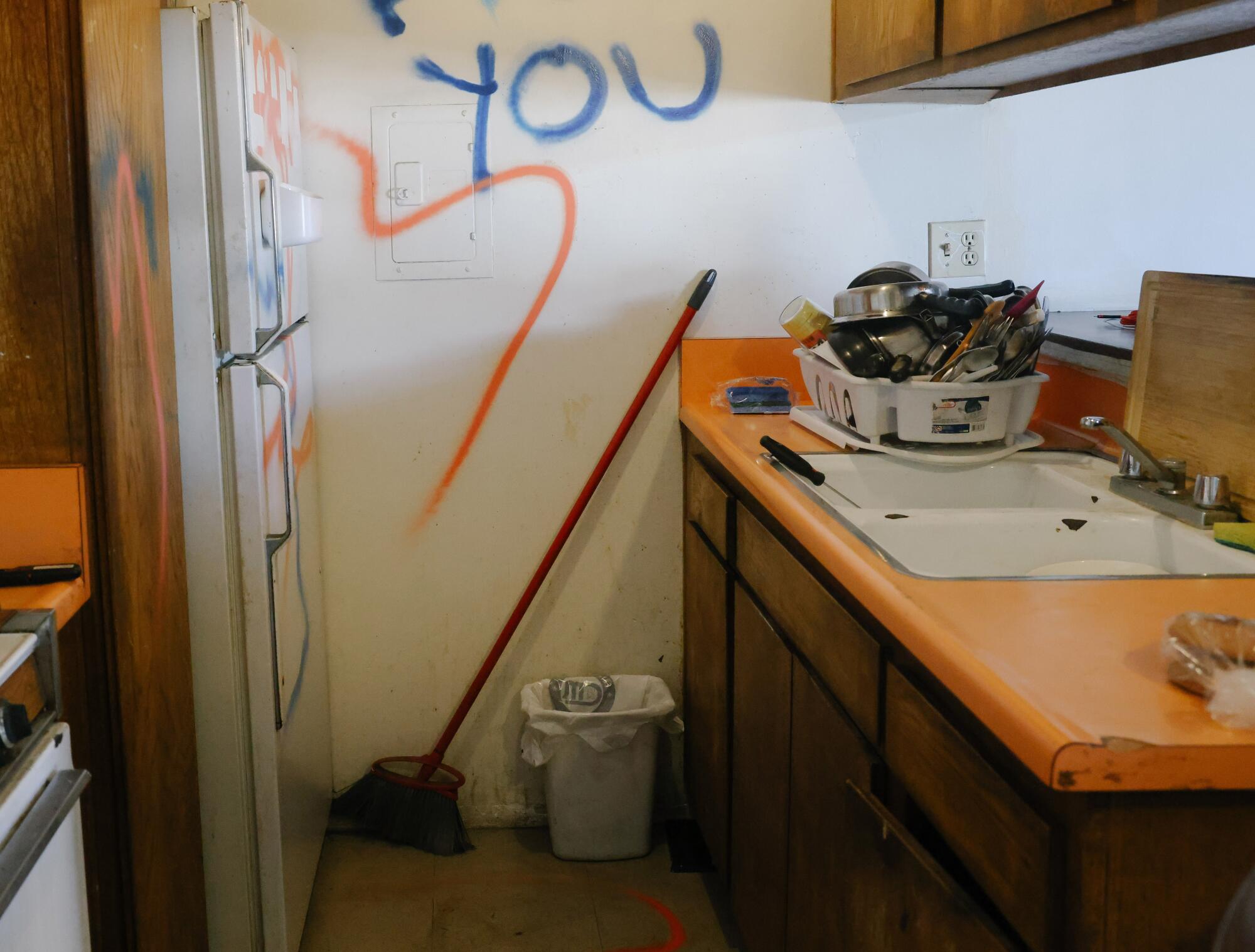
Roblero, a 50-year-old restaurant worker, has spent the last year attending as many Los Angeles County Board of Supervisors meetings as possible to seek more treatment services for his son and others.
On Sept. 18, a judge ordered that Roblero’s 25-year-old son, Jessie, who has schizophrenia, be moved from L.A. County jail to a locked mental health facility in Pomona.
But he remained in jail for three more months because the L.A. County Department of Mental Health has only about 50 beds for people in jail facing charges who a judge has said should be in a locked mental health facility instead. Those beds were full, with 21 people waiting.
“We only have 50 beds — and we only had 50 beds 20 years ago,” said Mark Gale, the criminal justice chair of the National Alliance on Mental Illness Greater Los Angeles County chapter.
The mental health assistants program run by inmate Craigen Armstrong has won plaudits from politicians and the sheriff. But its future is uncertain.
Roblero’s quest to help his son illustrates how complicated and confusing it can be for a parent to advocate for an adult child with serious mental illness in L.A. County’s justice system. He struggles to get information about his son’s well-being or his case, mostly getting his information from Jessie.
Roblero made seven visits over the last year to the Kenneth Hahn Hall of Administration in downtown L.A. so he could speak to the supervisors for one minute about why the county — whose jails have a history of failing to provide mental health care — needs to spend more on services.
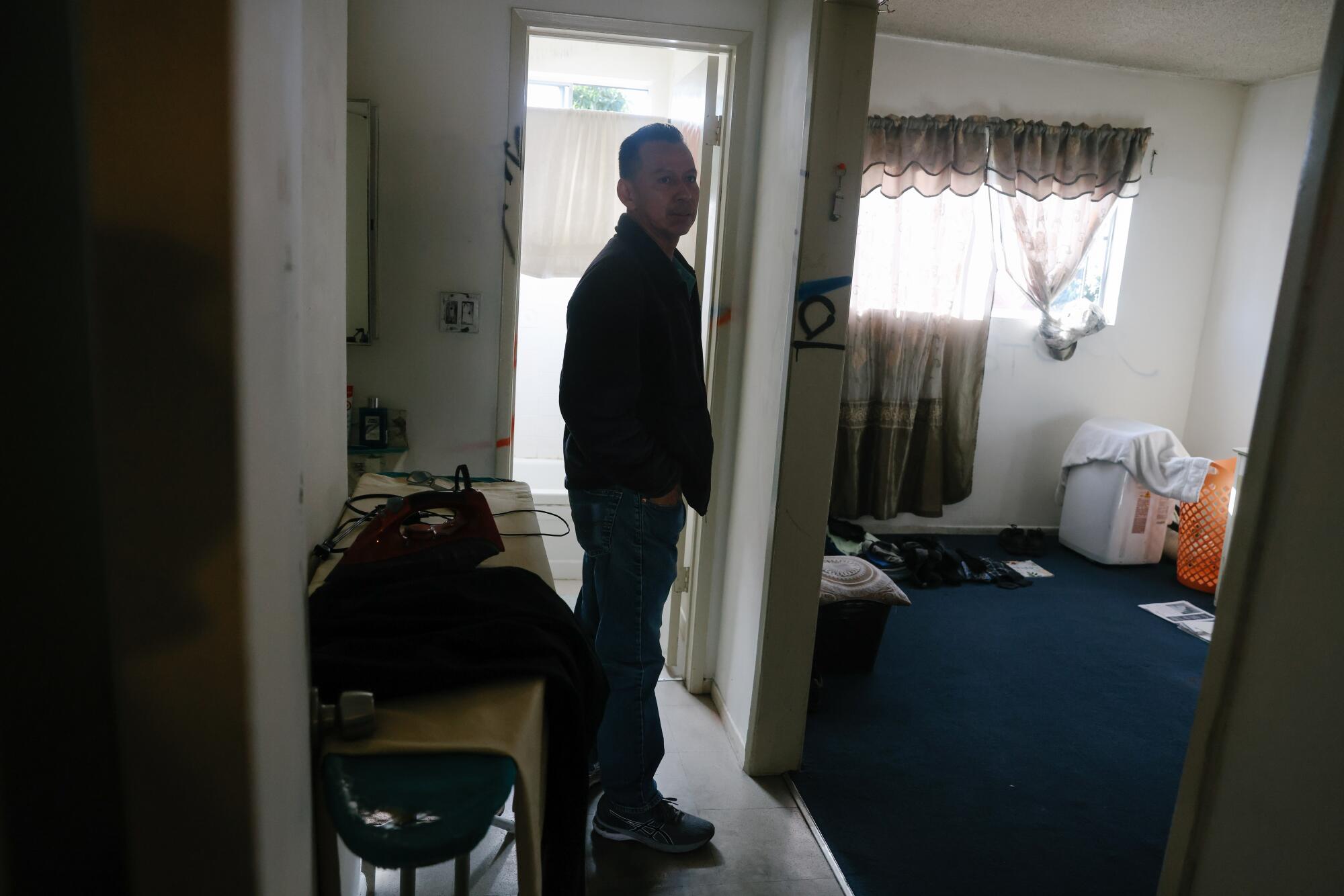
“I currently have a son who has been in jail for one year due to having a mental illness, and I’m just getting excuses, excuses, excuses from the court,” Roblero told the board in Spanish at its October meeting, his sixth time there. “And in reality, there are not programs for mental health. There’s no space. There are no beds for people with mental health issues. A person with mental illness, for them to be destined to be homeless or to be in jail, I don’t believe that that is just.”
Just after he spoke, Supervisor Hilda Solis asked that Roblero be connected with the jail’s mental health care team.
He was given a phone number, and when he called it he was told that Jessie was sixth in line to get out of jail.
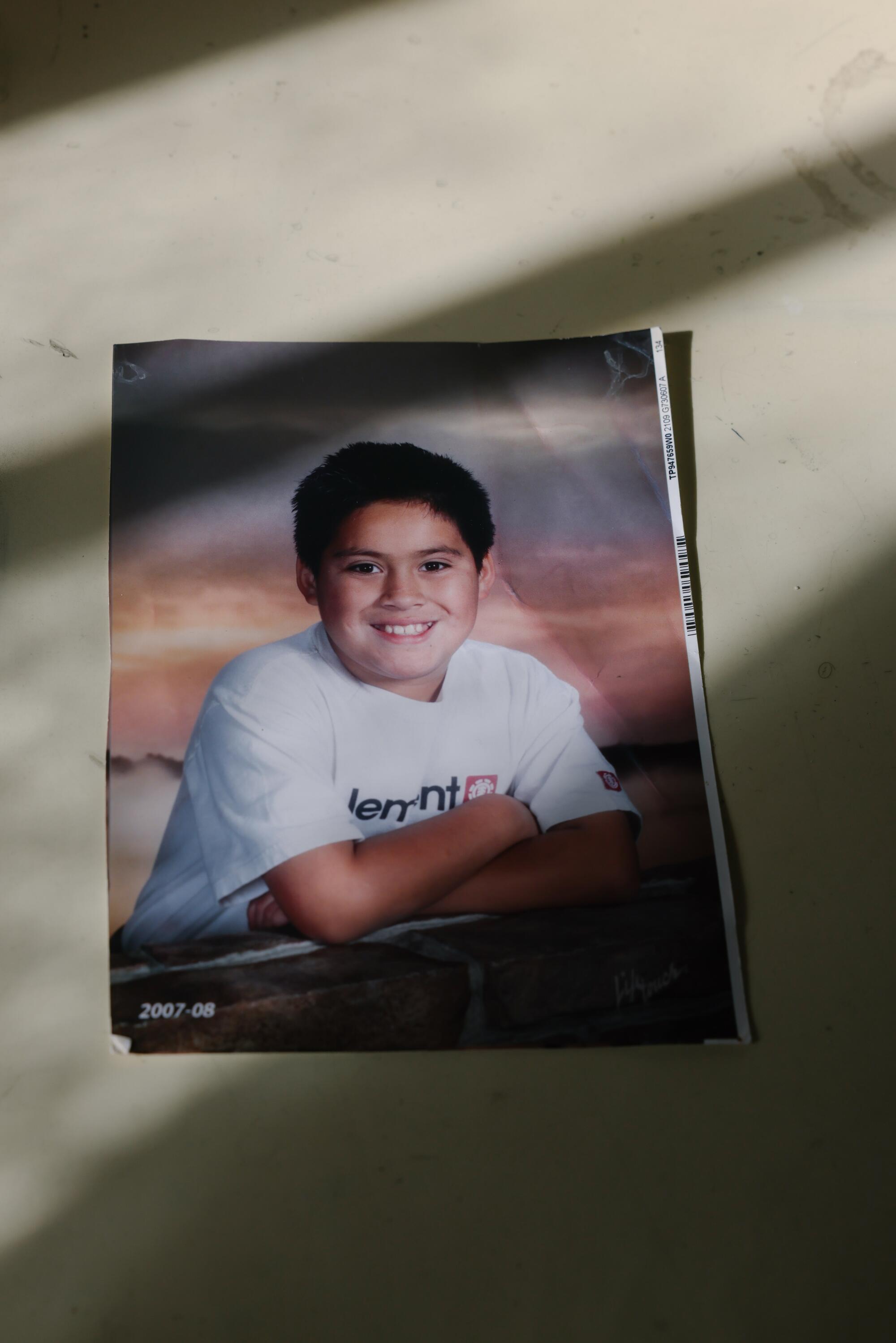
Roblero said he just wants his family and some version of their seemingly normal life back.
When he was 19, Roblero immigrated to Los Angeles from Tapachula, a city in southeast Mexico that sits about 30 minutes by car from the Guatemalan border, for better work opportunities.
He started as a day laborer, seeking work outside Home Depot each day for about six months. In 1994, a friend found him a job as a dishwasher at a restaurant, and he’s worked in the food industry since.
Roblero soon met his future partner in a dance club, and in 1998 Jessie was born.
The couple’s first child, he was a sweet and sensitive kid who was “beautiful like his mother,” Roblero said. He was smart and enjoyed skateboarding and playing the guitar.
Jessie took honors classes in high school and wanted to go to college to be a chemical biologist.

But a few months before Jessie was to graduate, Roblero noticed his son changing. Jessie was staying at home and sleeping a lot. He told his father he had social anxiety.
“I feel bad, because I told [him] one day, ‘Hey, don’t be lazy, you have to go to school,’” Roblero said. “I didn’t know what was happening in his head.”
Jessie soon told him that his phone had been hacked and was typing on its own. “If my phone is hacked, maybe yours is too,” he told his father.
One day Roblero got a call at work from a hospital. Jessie was there.
“Can we talk about your son?” Roblero remembers a doctor asking him, saying it needed to be face to face.
The doctor told Roblero that his son had schizophrenia. “What’s that?” Roblero asked.
“I wish this was from drugs,” the doctor told him of Jessie’s symptoms.
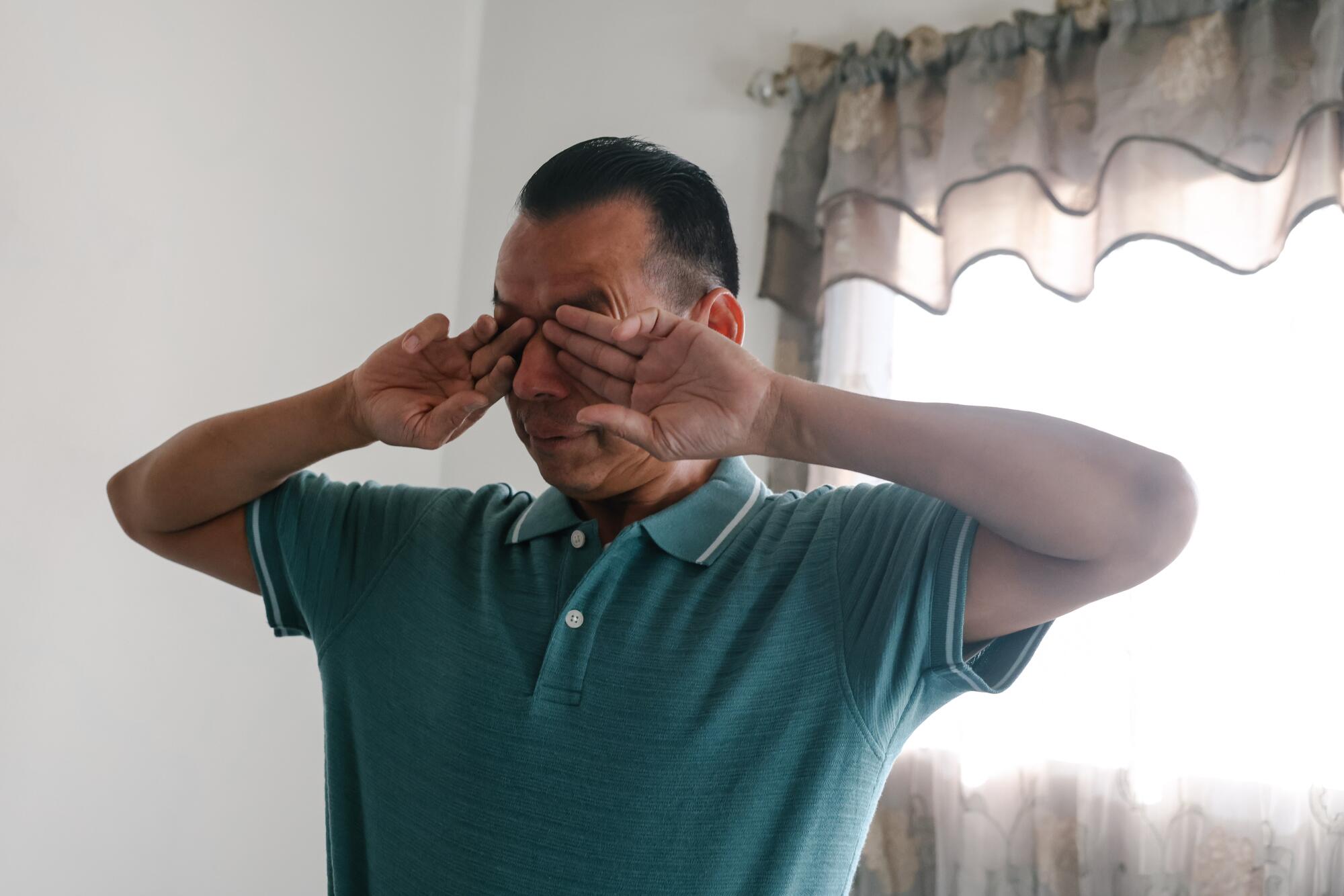
“My whole dreams [hit] the floor. I was hoping [for] him to be something in life. He was so smart. You can see your kids, when they are smart, [you think] ‘Oh, this guy’s going to be something in life,’” Roblero said.
Early in his diagnosis, Jessie did OK. He saw a therapist he trusted who regularly visited their Hollywood apartment. Jessie took a long-acting injection of an antipsychotic medicine, and although it made him tired, he kept taking it.
He enrolled at Santa Monica College, but got overwhelmed and left after a few months. He tried to work, putting together a resume even when his symptoms were still active.
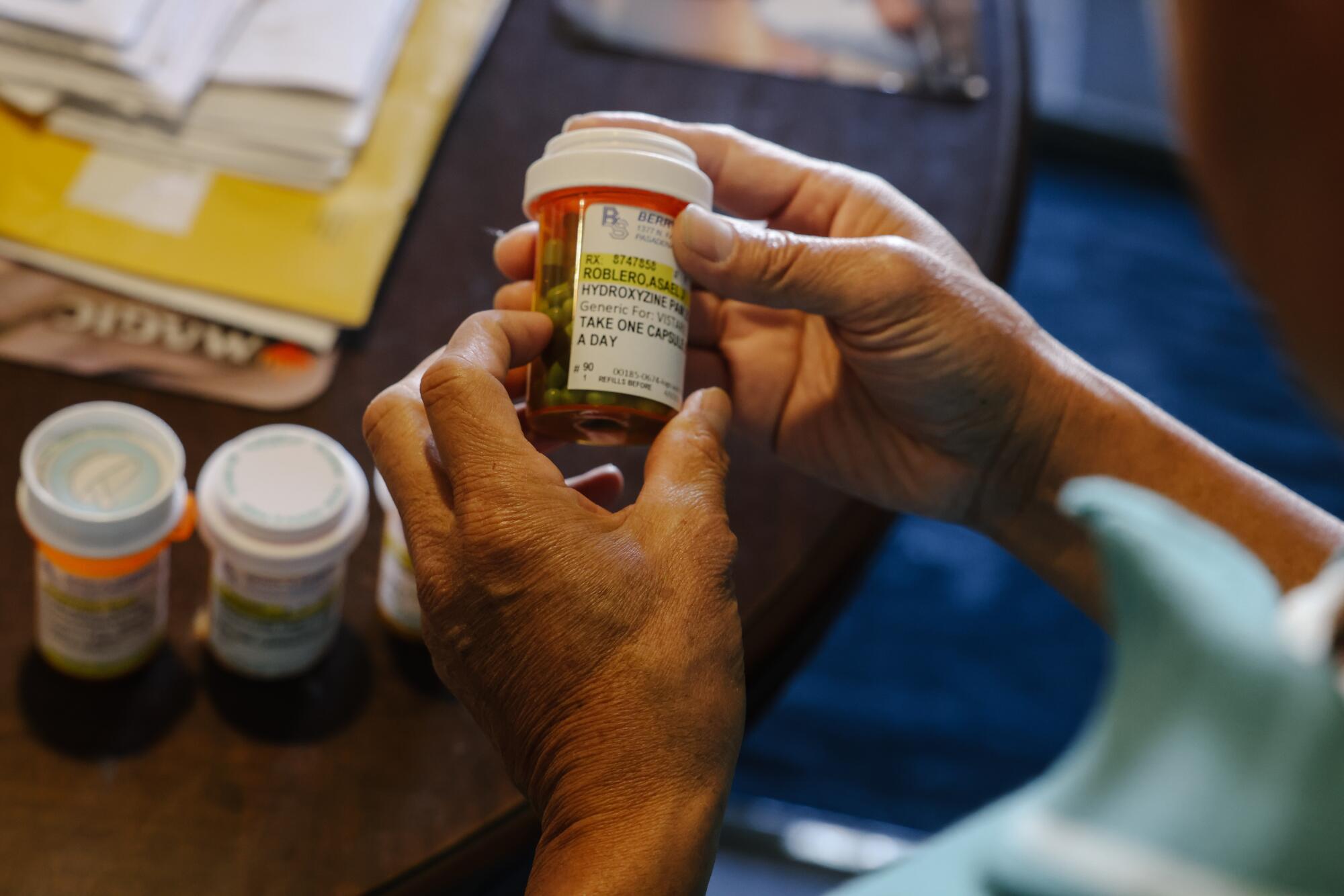
But in 2020, his therapist left his job, and Jessie went through a few therapists over telehealth, never meeting them in person because of the risks posed by COVID-19, his father said. He soon started drinking, which made his symptoms worse.
Jessie started regularly breaking their apartment’s front window and any electronics in the house.
At one point during his decline, Jessie was charged with a misdemeanor on allegations of hitting his mother and Roblero. The family had called the police to ask for a mental health team.
That call led to a restraining order that neither of Jessie’s parents asked for, Roblero said, and later resulted in their son going to jail when they didn’t follow it.
The L.A. city attorney’s office said in a statement that it is mandated by law to file a protective order in domestic violence cases, regardless of whether the victim wants it.
“This is done for public safety and for the victim’s safety,” the statement said.
Meredith Gallen, a member of the L.A. County Public Defenders Union, said the city attorney’s office has discretion — that its prosecutors could offer someone like Jessie a charge that wouldn’t require the protective order. The city attorney’s office declined to comment further.
For offenders with serious mental illnesses, a restraining order “means that clients cannot be housed with protected family members while they receive treatment, and it also means they cannot receive the physical and emotional support from loved ones that is critical to any rehabilitative process,” Gallen said.
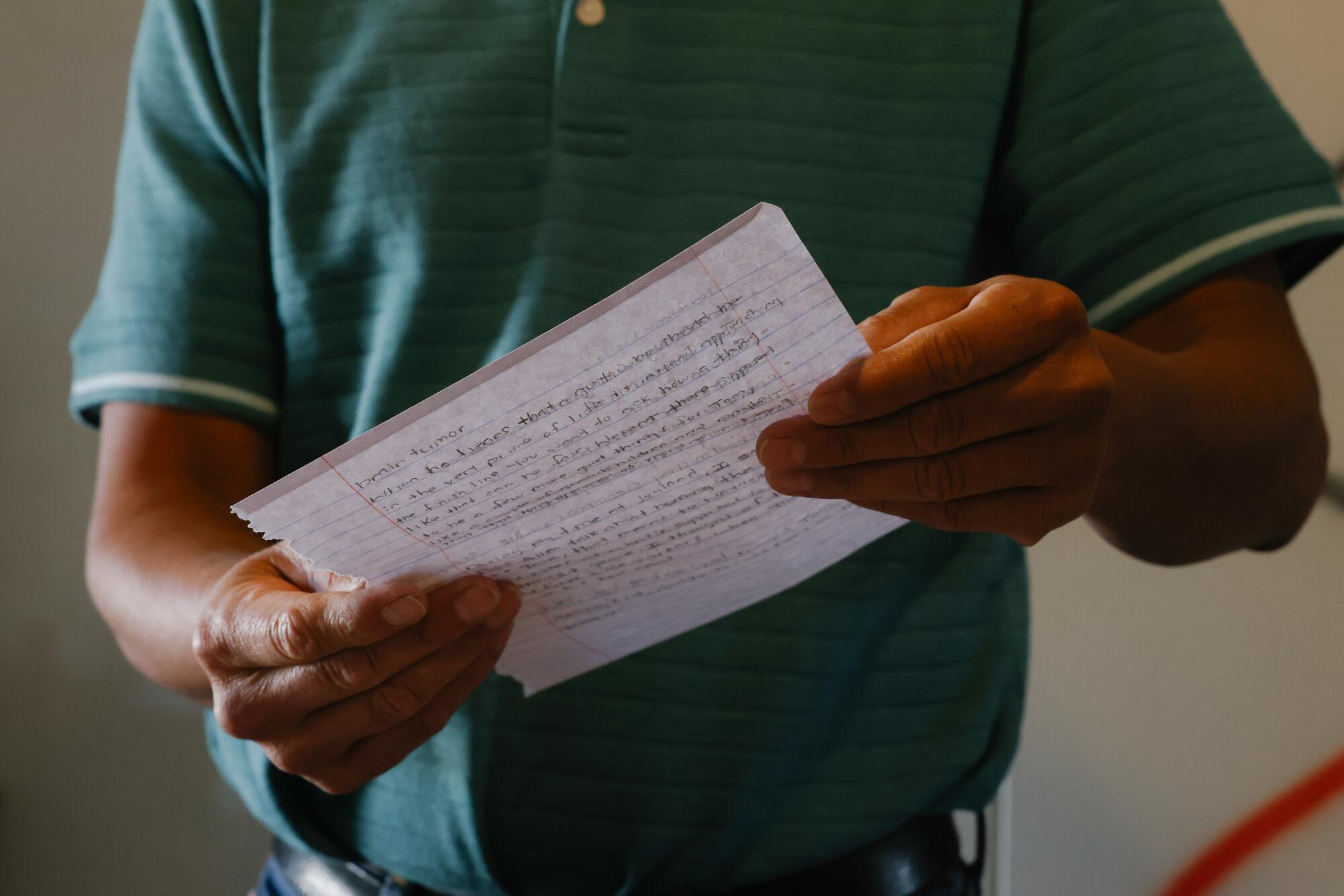
Roblero did not heed the order, he said, because doing so would have made his son homeless.
But that meant that every time Roblero called the police to request a mental health team when his son was damaging their apartment, the officers could arrest Jessie for violating the order.
Once, after Roblero had called them several times over a series of months, an officer threatened to arrest Roblero, he said.
“What do you want me to do? Throw him on the streets? On the streets, and he’s not stable, and you guys will kill him anyway,” Roblero remembered saying.
The cycle continued from early 2020 through 2022: Jessie would vandalize their apartment or act out, and Roblero would call the police to request a mental health team. Instead, officers would arrive and sometimes arrest Jessie.
Roblero has been threatened with eviction for all the damage, and because his neighbors are scared of Jessie. He said he didn’t understand mental illness until he was living it.

“Sometimes the neighbor30s call me at work [and say], ‘Oh, your son is throwing your stuff,’” Roblero said.
In September 2022, after breaking out their apartment window, Jessie went outside and destroyed the window of a vacant apartment in their complex. The police arrested him, and he’d been in jail since then, his father said.
Jessie’s charges include felony stalking — because he lived with his father despite the protective order. His previous arrests were all misdemeanors involving vandalism, assault on his parents and “willful disobedience” in following the restraining order, according to court records. He’d been in and out of court-ordered diversion programs, never finding the stability he’d had before his therapist left.
He was selected for the county’s Rapid Diversion Program, which tries to get people with mental illness or substance-use disorders out of jail and into mental health care, housing and other services. Unlike most who enter the program, he would be sent to a locked facility.
According to county data, the program has helped 2,000 people with mental illnesses or substance-use disorders get released from detention into services, and about 600 have graduated, meaning their charges have been dismissed and the cases have been expunged from their records.
But most aren’t ordered to locked facilities.
Public defenders, prosecuting attorneys and judges in L.A. work together to order treatment instead of incarceration for defendants whose crimes arise from mental illness.
Generally, a person might be ordered to a locked facility because a judge decides they’re too ill to be treated in an unlocked setting, or because they’ve been charged with violent crimes and a judge or district attorney won’t let them leave jail for care unless the site is locked.
The debate over locked facilities is among the most heated among mental health advocates, pitting family groups like the National Alliance on Mental Illness against civil rights groups such as the American Civil Liberties Union and Disability Rights California.
In April, Solis put forth a motion, co-written by fellow Supervisor Janice Hahn, asking county health leaders to find 500 more locked-facility beds.
Six months later, the supervisors learned — after hearing from Roblero and other advocates who pointed to long delays in being transferred from jail — that most of the 500 beds weren’t yet available.
Supervisor Kathryn Barger asked what progress had been made.
Lisa H. Wong, who leads the county Department of Mental Health, told the board that 185 new beds were available or would be soon, and the rest of the 500 would open “over the course of the next several fiscal years.”
“How many are available today if I called or the jail called and said they want to divert?” Barger asked.
Barger said she was concerned, especially given the settlement the county recently reached with the ACLU over jail conditions.
L.A. County jail inmates are left to defecate in garbage cans and sleep chained to chairs or benches, ACLU alleges in demand for an emergency court order
Outside of the 185 new beds, Wong said, they’d also added 55 beds for those leaving jail who aren’t as sick — noting that “we have people lined up” to take them.
The county Department of Mental Health gives priority for its 500 new treatment slots to people in conservatorships — legal directives put in place when someone is unable to oversee their own welfare and a third party, named by a court, is responsible for them — because these patients have immediate release orders.
They’ve likely been found incompetent to stand trial, and their charges — unless murder — are dropped, the department said in a statement. The criminal court is no longer involved in their treatment.
Jessie is not under a conservatorship and has not been found incompetent to stand trial.
“The fundamental thing here is that we’ve got every player in the system ... saying the right thing to do here is not to hold this person in jail, and yet this person is languishing in jail and — [in] a jail system that for more than 25 years has been found by the United States government to violate the rights of people with mental illness,” said Peter Eliasberg, chief counsel for 1st Amendment rights at ACLU of Southern California.
The first time Roblero called Los Angeles police to try to help his son, an officer gave him a card for the National Alliance on Mental Illness.
Through attending those meetings, he has met parents who don’t know where their adult children are or who could point to them sleeping under a bridge. He fears that for Jessie.
“That’s why I’m trying to go to the supervisors, to do a little bit more,” he said. “It’s not only me. It’s a similar situation everywhere, the same stories I hear from other parents.”
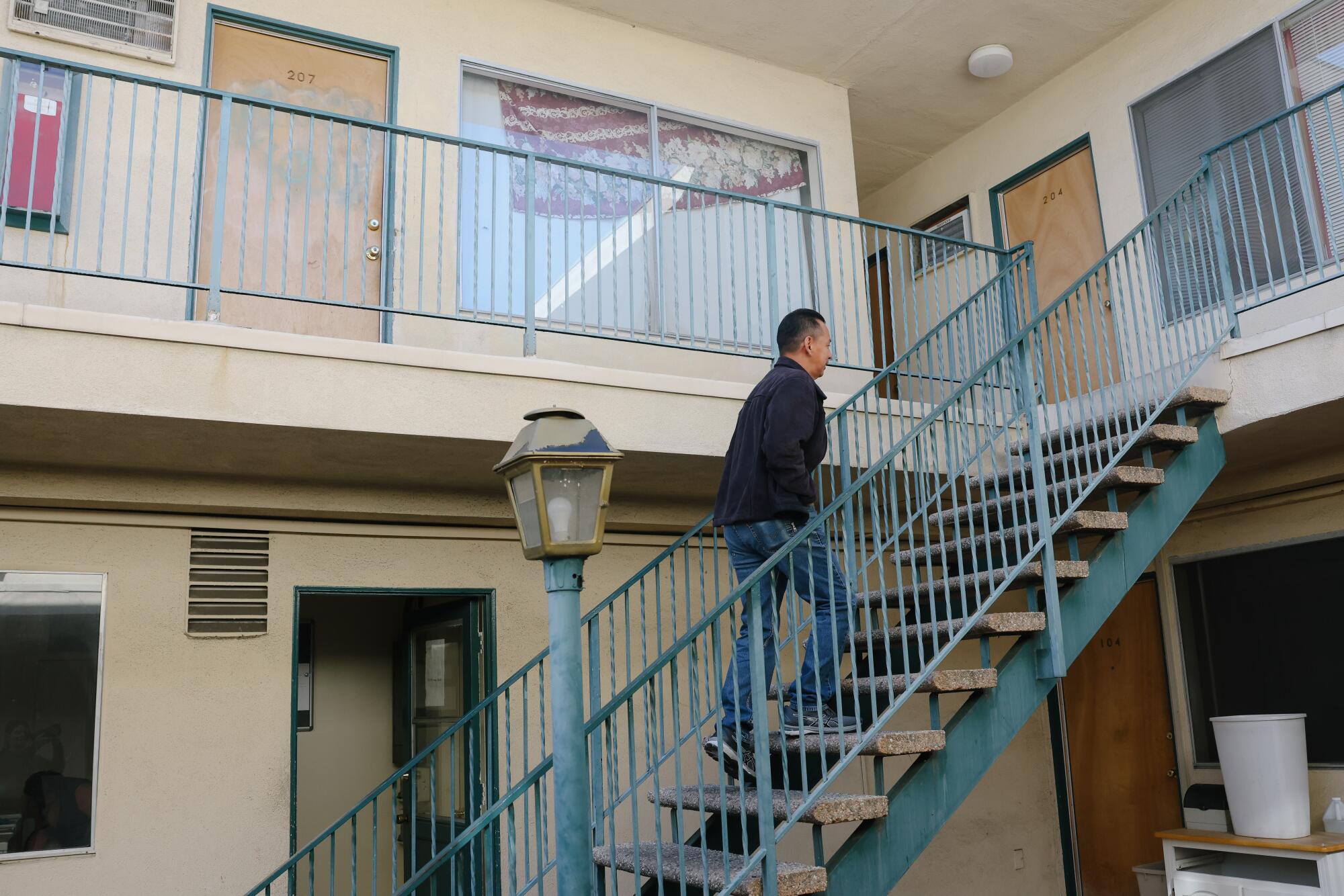
Roblero knew little about the county mental health system before his son got sick, and didn’t intend to become an advocate for judicial system reform.
He was downtown for his son’s court date when he walked past the county Hall of Administration, where the supervisors meet. He saw a large group of activists and got curious. He began attending the board meetings, and connected with local nonprofit Dignity and Power Now, which advocates for justice reform.
But on Wednesday afternoon, Roblero wondered whether his advocacy had mattered. He had just learned that Jessie had requested to leave the voluntary locked program and go back to jail. No one from the court informed Roblero.
Jessie had called his mother and told her the voices were getting to him, and that he was more comfortable in jail.
A few weeks ago, a jail physician stopped prescribing Jessie his antipsychotic medicine, Haldol, instead prescribing only Benadryl for sleep and another medicine for anxiety, Roblero said. He fears his son got only sicker during his year in jail and is too unwell to understand the impact of his choices.
In quiet moments at home, Roblero sometimes wonders how he can save his son.
“Sometimes I feel like there’s no exit,” he said.
More to Read
Sign up for Essential California
The most important California stories and recommendations in your inbox every morning.
You may occasionally receive promotional content from the Los Angeles Times.
